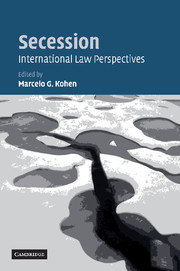Book contents
- Frontmatter
- Contents
- List of contributors
- Preface
- Table of cases
- Table of international instruments
- List of abbreviations
- Introduction
- PART I The Foundations of International Law and Their Impact on Secession
- 1 Secession and self-determination
- 2 Secession, terrorism and the right of self-determination
- 3 Secession and external intervention
- 4 The role of recognition in the law and practice of secession
- 5 The State as a ‘primary fact’: some thoughts on the principle of effectiveness
- 6 A normative ‘due process’ in the creation of States through secession
- 7 Secession and the law of State succession
- 8 Are there gaps in the international law of secession?
- PART II International and Domestic Practice
- 15 Conclusions
- Select bibliography
- Index
8 - Are there gaps in the international law of secession?
Published online by Cambridge University Press: 23 July 2009
- Frontmatter
- Contents
- List of contributors
- Preface
- Table of cases
- Table of international instruments
- List of abbreviations
- Introduction
- PART I The Foundations of International Law and Their Impact on Secession
- 1 Secession and self-determination
- 2 Secession, terrorism and the right of self-determination
- 3 Secession and external intervention
- 4 The role of recognition in the law and practice of secession
- 5 The State as a ‘primary fact’: some thoughts on the principle of effectiveness
- 6 A normative ‘due process’ in the creation of States through secession
- 7 Secession and the law of State succession
- 8 Are there gaps in the international law of secession?
- PART II International and Domestic Practice
- 15 Conclusions
- Select bibliography
- Index
Summary
Developments in current international law have raised the perception of gaps in the field of secession. It seems that States constantly oscillate between two tendencies. The first is characterised by the refusal to extend international legal regulation (apart from that applicable to protecting human rights) to what is a priori a matter of State sovereignty and ‘internal affairs’. It does not appear therefore to be a question of a lacuna, this term implying that the law does not give an answer to a question that arises in its field of application, this last condition not having been filled.
The second tendency consists of opposing to secessionist groups and their sources of external support the obligation to respect the territorial integrity of the threatened State and, in parallel, legalising the principle of military response of the latter. Then, far from being neutral or silent on the matter, international law seems to rule very clearly in favour of the State.
LE DROIT INTERNATIONAL EST-IL LACUNAIRE SUR LA QUESTION DE LA SÉCESSION?
On a généralement défini la sécession comme ‘la démarche par laquelle un groupe ou une partie d'un Etat cherche à se détacher de l'autorité politique et constitutionnelle de cet Etat, en vue de former un nouvel Etat doté d'une assise territoriale et reconnu au niveau international’. Pour notre part, nous envisagerons plus spécifiquement la sécession comme la tentative de créer un Etat par la force ou la violence, en ne retenant pas les hypothèses de création d'Etat opérées par la voie pacifique que l'on qualifiera de séparation voire, si l'Etat prédécesseur a cessé d'exister, de dissolution.
- Type
- Chapter
- Information
- SecessionInternational Law Perspectives, pp. 231 - 254Publisher: Cambridge University PressPrint publication year: 2006
- 1
- Cited by



